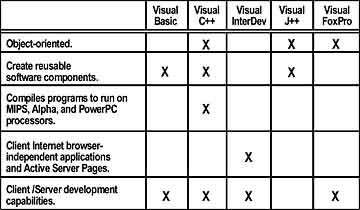Creating a Web Page in Visual InterDev
Choosing a Visual Studio Development Tool
Selecting the appropriate Visual Studio development tool involves analyzing application deliverables. For example, you may need to address some of these questions:
- Will the application run on non-Windows platforms?
- Will object-oriented programming techniques be used in development?
- Does the application need to run on a Web page?

Object-Oriented Programming
In contrast with procedural programming, object-oriented programming involves the use of both object-oriented design and an object-oriented programming language.
Instead of consisting of sets of data associated with many different procedures, object-oriented programs consist of software modules called objects that encapsulate both data and processes. There are four key characteristics of an object-oriented programming language:
- Abstraction
- Encapsulation
- Inheritance
- Polymorphism
Because they provide these characteristics, the following Visual Studio components are considered object-oriented programming languages:
- Visual C++
- Visual FoxPro
- Visual J++
Creating Reusable Software Components
Visual C++ provides the most powerful solution for developing software components. It includes a COM editor for generating and maintaining COM objects. (COM will be discussed in Chapter 5.) In addition, wizards are available for creating ActiveX controls and components. Visual C++ also provides native compiler support for COM, Visual COM Editing, and a COM Wizard that generates Active Template Library (ATL) code for accelerated development of lean, fast components.
Visual Basic is one of the fastest ways to build ActiveX controls. Wizards support the development and deployment of ActiveX controls, including the ActiveX Control Interface Wizard, the Property Page Wizard, and the Setup Wizard.
Developers who use Visual J++ can use components to extend Java code for solutions based on Windows and can create reusable ActiveX Server Components. It also includes a wizard that eases the creation of ActiveX Server Components.
Multiple Processors and Platforms Support
If an application needs to run on various types of processors such as MIPS, Alpha, RISC, or PowerPC, the best solution is Visual C++. Visual Basic applications will only run on Windows platforms.
C++ is a standard language that is open , flexible, and highly portable. It is the primary language used to access the complete features of multiple platforms. For example, you can use Visual C++ to leverage your existing source code, tools, and expertise when porting applications from the Windows operating system to UNIX or Macintosh systems.
Internet Applications Development
For Internet or intranet development, Visual J++ and Visual InterDev are powerful solutions. Visual J++ allows you to create applications and software components to run on platforms that include a Java virtual machine or any Java-enabled browser.
With Visual InterDev you can automatically generate the HTML and scripting logic necessary to create database-driven Web sites using VBScript and JScript. These HTML-based applications can be viewed on any Web browser on any platform.
Client/Server Development
Visual FoxPro allows you to prototype and implement client/server applications. It is a professional developer's desktop database for rapid application development, object-oriented programming, and is an excellent front-end tool for accessing back-end server data. A Visual FoxPro-based client/server application provides speed, massive data storage, and built-in security for an ODBC-based data source or server.
Visual Basic can also be used to create high-performance client/server applications. The ODBC-based remote data control is optimized for systems such as Microsoft SQL Server and Oracle7. The Remote Data Control has a complete OLE-based object library for programmatic control over databases. Visual Basic also provides support for asynchronous queries. For example, using Remote Data Objects (RDO) in your client/server program, a user can continue with other tasks in the program while another operation, such as a large query operation, is being performed in the background.
Visual InterDev makes it easy to integrate client/server and Web technologies to develop Web applications that provide a distinct business advantage.
In addition, Visual C++ uses the client/server framework and Microsoft Foundation Classes (MFC) to enable database development. This is done by using classes or components to encapsulate database connectivity and transactions. The legacy maintenance tools included with Visual C++ make it easier to integrate with existing mainframes and networks.
EAN: N/A
Pages: 324